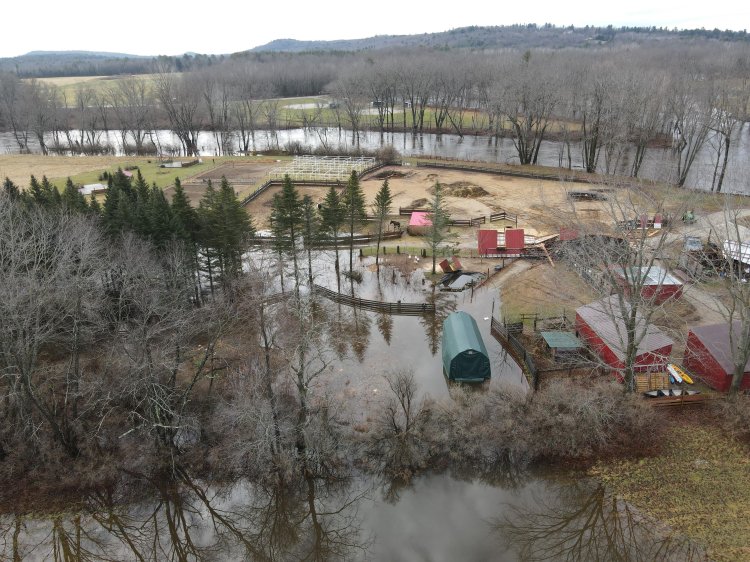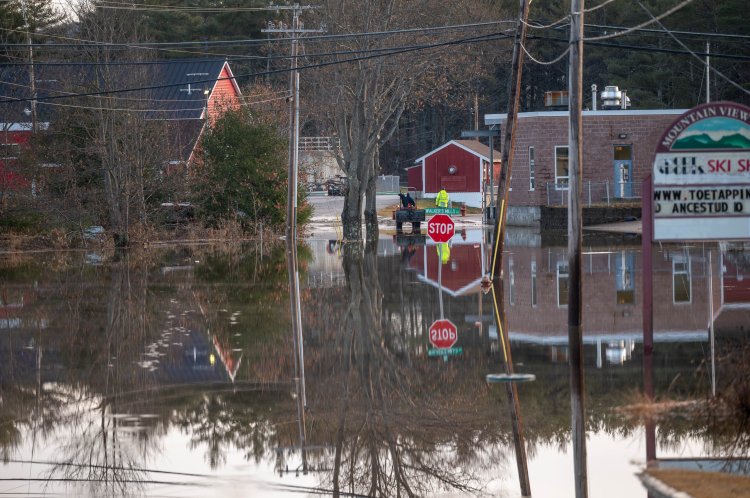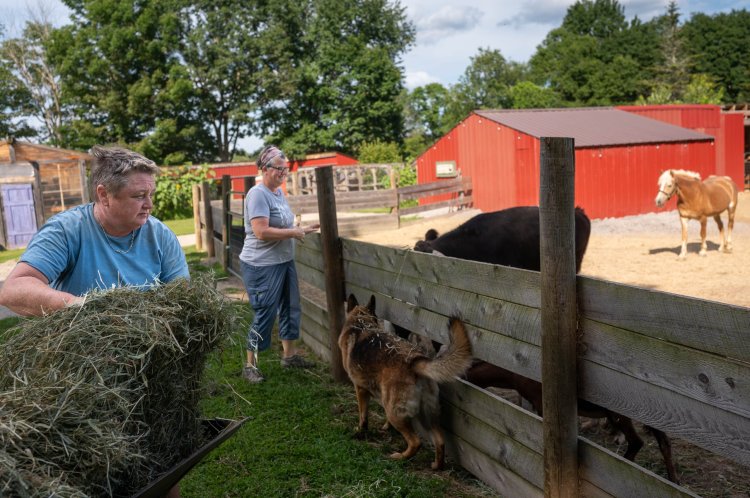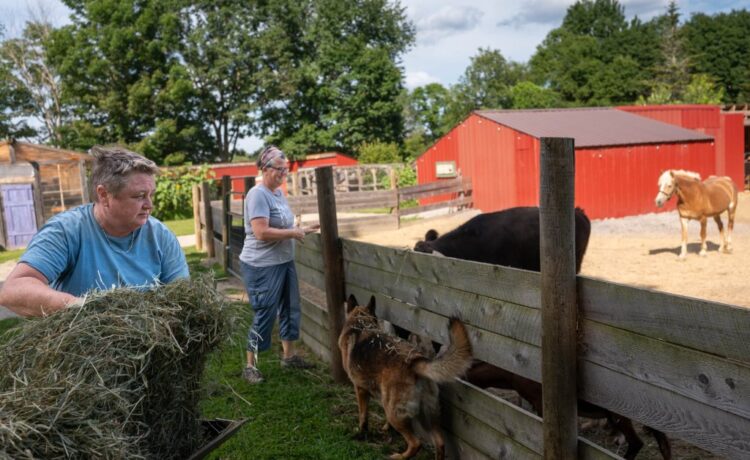

An aerial photo shows the flooding on Dec. 18, 2023, of the Blue Heron Farm and Retreat in Turner. Ron Blake photo
AUGUSTA — About 14 businesses and nonprofits in Androscoggin, Oxford and Franklin counties are expected to receive state grants to help them recover from storms that devastated parts of the state last winter — particularly the Dec. 18, 2023, storm — which resulted in widespread flooding and windstorm damage.
Business Recovery and Resilience Grant funds will help 109 businesses and nonprofits in every county across the state make repairs to and improve upon their facilities to help mitigate damage from storms last winter and to prevent damage from future storms, according to a Thursday news release. Of the total $5.8 million that was awarded, businesses can receive up to $100,000.
The funds can be used for design, permitting and construction costs related to projects to help the businesses address the impacts of storms last winter, along with allowing them to make improvements to mitigate potential issues in future storms and conditions caused by climate change, according to the release.
Some of those improvements and renovations may include infrastructure upgrades, installing or improving drainage systems, moving electrical or business equipment, business relocation and buying additional insurance, according to the release.
“These important grants will help businesses rebuild in a more resilient way that improves their ability to withstand future storms, which will protect the jobs and livelihoods of Maine people and safeguard our economy from the destructive impacts of climate change in the long-run,” Gov. Janet Mills said in the release.


Walkers Mills Road into Bethel, which is Route 26, is flooded after the Dec. 18, 2023, heavy rainstorm. Andree Kehn/Sun Journal file
Four Bethel businesses are expected to receive grant funds, an area that was hit hard by the Dec. 18 storm last year. Several inches of rain fell during that storm, flooding homes and businesses. The Bethel Fire Department answered nearly two dozen calls in the three days after the storm. It made over two dozen water-related rescues after the storm.
Just two weeks before opening its doors to winter recreation students, Maine Adaptive Sports and Recreation’s driveway was washed out during the Dec. 18 storm, according to Managing Director Amy Bannon.
The storm caused roughly $144,000 worth of damage to the property, she said. The $70,000 state grant awarded to the organization will largely reimburse them for much of the work, which has already been done.
Sunday River stepped in right after the storm and provided heavy equipment and crews to create a temporary solution so the facility could be accessed, she said. The local and larger adaptive sports community also stepped up and they were able to raise more than $30,000 to put toward the property repairs.
“Beforehand we certainly were prepping for the worst and making sure our building was secure, our vehicles were out of the way of the flood zone and then the aftermath was astronomical,” she said. “And thankfully, Bethel being a small community, it meant that folks were quick to take action and support one another, and we’re really grateful for that community support.”
Maine Adaptive Sports and Recreation had to replace a metal culvert that was damaged by the storm, she said. The new drainage system is larger and more resilient to large rainstorms, however placing in the more resilient system nearly tripled the construction price because electrical and phone lines had to be rerouted — transitioning its whole internet system.


A pickup truck is stranded Dec. 19, 2023, on the Sunday River access road after a heavy rainstorm the day before. Andree Kehn/Sun Journal file
Only a few smaller repairs have yet to be finished, such as gravel work on the driveway, but the business is on track to open and offer services this winter, she said.
“We’re so grateful for the opportunity to receive funding that not only allows us to stay open but is forward looking as Maine experiences more weather events like this one,” she said.
Blue Heron Farm and Retreat Bed and Breakfast co-owners Mason and Christina Bonda-Riva are expected to get a $75,000 grant, according to the governor’s Thursday press release. But the two’s grant application is still pending review, according to a letter they received from the state Thursday.
They will also use part of their grant money to construct a berm toward the back of their Turner property where there was a lot flooding, which caused damage to furniture they had stored in a barn in the area, they said. They also lost a lot of stored hay and firewood to flooding.
“Living on a river comes with its perks but it also comes with its risks,” Christina Bonda-Riva said. “We always had heard about the 100-year storm … but you never think you’re going to experience it but our river was the highest anybody had seen it in a real long time.”
Heavy winds also damaged other parts of their property, including blowing a structure completely over that was housing their rescue animals — miraculously none of the animals were harmed, they said.
They had to rent a crane for the blown-over structure and they tried to salvage what materials they could but they ended up having to buy a lot of building materials for repairs, Mason Bonda-Riva said. The winter is usually their down time when profits are low.
“It hurt,” she said. “That’s our time to rest and recuperate from a long season and not a lot of income whatsoever, and so it was dramatic on all ends,” she said.
They initially worked with Federal Emergency Management Agency but there was no damage to their home so they were not able to get funds from that organization, Christina Bonda-Riva said. They received a United States Small Business Administration loan quickly and completed most of their repairs with that money.
When they applied for the state grant, they did not expect to be approved but were pleased to find out that they were selected, Christina Bonda-Riva said. They intend to pay off the loan with the funds and fund some other repairs and renovations, such as the berm and finishing the barn for the animals before winter.
As much as people complain about the government, Christina Bonda-Riva’s experience working with various government agencies regarding this situation was good, she said. She found them to be efficient and helpful.
“And of course, we’re very thankful for this,” she said. “You know the fact that Gov. Mills and the Legislature decided to put this Business Recovery and Resiliency Grant into place is amazing and is going to be really helpful for us as a small business, to be able to get out of the hole that we’re in, a little bit, from that storm.”
The grant funds come from a $10 million Business Recovery and Resilience Fund and was approved by the governor and Legislature as part of larger storm relief designated funding of $60 million, according to the news release.
“The single largest investment in storm recovery by any Administration in Maine history,” the release said.
The remaining roughly $4.2 million in the fund will be issued by the Department of Economic and Community Development in a second round of grant awards in the coming months, according to the release.


Mason Bonda-Riva, left, and her wife, Christina Bonda-Riva, feed their goats, horse and cow Thursday at their Blue Heron Farm and Retreat in Turner. The couple learned Thursday that they had been approved for a grant to recover some of the money spent after the Dec. 18 rainstorm wiped out much of their farm’s infrastructure. The red barn in the background had been completely destroyed in the storm and was quickly repaired with the help of family and neighbors. Andree Kehn/Sun Journal















